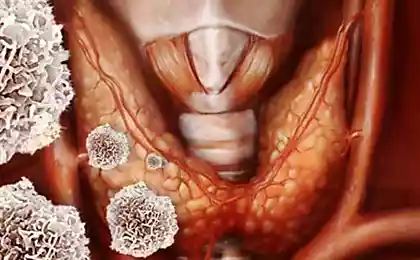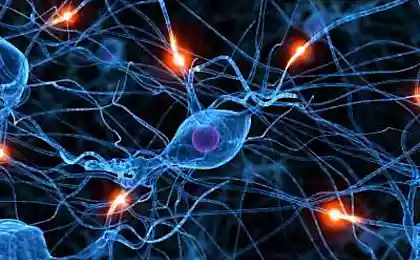470
The science of spontaneous healing
Man strikes a terrible disease. Doctors leave all hope. And suddenly the disease is retreating. This is a great plot for a soap Opera, but it happens in real life. The question is, how?

What is spontaneous remission? The medical community is trying to ignore spontaneous remission, also known as the cure itself, but the reason is not in a sinister conspiracy. Actually, some doctors do not believe in this phenomenon – at least in relation to certain diseases – but most of them are just trying to let people entertain false hopes, and, more importantly, to use about medication. Internet sites suggest a variety of ways to achieve spontaneous remission, from ginseng to positive thinking. Although almost all of these treatments do not cause physical harm, extortion of money from sick people is not so harmless.
Some professionals do not like the word "spontaneous". They believe that recession of the disease is a specific mechanism. These assumptions are based on the fact that in some types of cancer the patient is improving faster than in other types of this disease. Five types of cancer – kidney cancer, leukemia, and lymphoma, neuroblastoma, breast cancer and melanoma – relatively prone to unreasonable remission. Other cancers, such as pancreatic cancer, rarely undergo spontaneous remission, and several documented cases of this phenomenon could be due to the production of incorrect diagnosis.
"Spontaneous remission" is a popular term, but more accurate is the definition of "spontaneous regression".Although spontaneous regression of some types of cancer are forever, most of the spontaneous improvement of patients lasts only for a while, and then the cancer returns and progresses at its normal course. Even a temporary regression of the disease may give the patient additional life-years, or at least significant improvement in the quality of his life. All oncologists hope for recovery of their patients, they just do not expect that it will happen suddenly and without treatment.
What causes spontaneous remission?
Doctors are trying to get rid of the "spontaneous" component of spontaneous remission, but they are not motivated by the desire to disprove the miracle. Their goal is to transform a miracle into something earth. If there is a mechanism that can be used in the fight against cancer, its detection and the reconstruction in each patient can save countless lives. Oncology is the science related to many painful procedures such as chemotherapy and surgery. The discovery of a method of treatment that would be invisible to patients, it would be a huge leap forward in terms of patient care.
While the term "spontaneous" is unchanged, because the causes of remission and regression remains unknown. Find out the causes of this process have tried many. In one study represented a wide range of ideas:
According to a widespread hypothesis about the mechanisms leading to spontaneous regression, the most important component is the immune response of the host. Other mechanisms causing spontaneous regression include the increase in apoptosis and necrosis, epigenetic changes, hormonal reactions, the influence of oncogenes and tumor suppressors, cytokines and growth factors, and physiological mechanisms.This leaves much room for manipulation.
Scientists also have found a few unbroken links. In one confirmed case, a marked regression of pancreatic cancer occurred after the infection has caused the patient has a strong temperature rise. In some other cases, cancer was also discovered the relationship of "febrile infection" with regression and remission. The authors of some publications propose to revise the controlled fever as a way of triggering an immune response that is able to overcome cancer.
Spontaneous remission happens more often than we can imagine?
According to some studies, spontaneous remission and regression occurs more frequently than described in the literature. The studies confirm that a large number of cases spontaneous remission was not recorded due to the fact that the doctor suggested a wrong diagnosis, didn't want to describe in detail the event or in connection with the fact that the patient felt better and stopped treatment.
The results of several studies have shown that spontaneous remission may occur in a significant number of cases.In one study, researchers for 12 months watched people with one or more solar keratosis, and noted that one third of the subjects experienced spontaneous remission. Solar keratosis is not cancer; it monolpoly growth on the skin formed when the skin damage from the sun. By itself solar keratosis is not dangerous, but it frequently tends to become malignant. The fact that solar keratoses can pass for no apparent reason gives reason to believe that other tumors is also able to heal spontaneously.
The most significant study associated with spontaneous regression, was completed in 2001. In the period from 1996 to 2001, the researchers invited women aged 50 to 64 for regular screening for detection of breast cancer. It would be unethical to ask others to refrain from such a medical examination with a view to the formation of the second group, so a parallel group of women not undergoing examinations formed was not. Instead, at the beginning of the study, the researchers were invited to survey women of the same age who have not had this procedure in the last six years. The total number of carcinomas have regularly held a survey of women was greater than that of those who have passed the examination only after six years. The researchers found that
under the [regular] held a survey, the total frequency of invasive breast cancer remained 22 percent higher. Cancer of the breast could be caused by regular screening, or a large percentage of this disease just regressed without treatment.
The idea that someone can get cancer without knowing it, is appalling. But at the same time, it is encouraging. Spontaneous remission can prepare the ground for is not a spontaneous treatment. published
P. S. And remember, just changing your mind — together we change the world! ©
Source: mixednews.ru/archives/77489

What is spontaneous remission? The medical community is trying to ignore spontaneous remission, also known as the cure itself, but the reason is not in a sinister conspiracy. Actually, some doctors do not believe in this phenomenon – at least in relation to certain diseases – but most of them are just trying to let people entertain false hopes, and, more importantly, to use about medication. Internet sites suggest a variety of ways to achieve spontaneous remission, from ginseng to positive thinking. Although almost all of these treatments do not cause physical harm, extortion of money from sick people is not so harmless.
Some professionals do not like the word "spontaneous". They believe that recession of the disease is a specific mechanism. These assumptions are based on the fact that in some types of cancer the patient is improving faster than in other types of this disease. Five types of cancer – kidney cancer, leukemia, and lymphoma, neuroblastoma, breast cancer and melanoma – relatively prone to unreasonable remission. Other cancers, such as pancreatic cancer, rarely undergo spontaneous remission, and several documented cases of this phenomenon could be due to the production of incorrect diagnosis.
"Spontaneous remission" is a popular term, but more accurate is the definition of "spontaneous regression".Although spontaneous regression of some types of cancer are forever, most of the spontaneous improvement of patients lasts only for a while, and then the cancer returns and progresses at its normal course. Even a temporary regression of the disease may give the patient additional life-years, or at least significant improvement in the quality of his life. All oncologists hope for recovery of their patients, they just do not expect that it will happen suddenly and without treatment.
What causes spontaneous remission?
Doctors are trying to get rid of the "spontaneous" component of spontaneous remission, but they are not motivated by the desire to disprove the miracle. Their goal is to transform a miracle into something earth. If there is a mechanism that can be used in the fight against cancer, its detection and the reconstruction in each patient can save countless lives. Oncology is the science related to many painful procedures such as chemotherapy and surgery. The discovery of a method of treatment that would be invisible to patients, it would be a huge leap forward in terms of patient care.
While the term "spontaneous" is unchanged, because the causes of remission and regression remains unknown. Find out the causes of this process have tried many. In one study represented a wide range of ideas:
According to a widespread hypothesis about the mechanisms leading to spontaneous regression, the most important component is the immune response of the host. Other mechanisms causing spontaneous regression include the increase in apoptosis and necrosis, epigenetic changes, hormonal reactions, the influence of oncogenes and tumor suppressors, cytokines and growth factors, and physiological mechanisms.This leaves much room for manipulation.
Scientists also have found a few unbroken links. In one confirmed case, a marked regression of pancreatic cancer occurred after the infection has caused the patient has a strong temperature rise. In some other cases, cancer was also discovered the relationship of "febrile infection" with regression and remission. The authors of some publications propose to revise the controlled fever as a way of triggering an immune response that is able to overcome cancer.
Spontaneous remission happens more often than we can imagine?
According to some studies, spontaneous remission and regression occurs more frequently than described in the literature. The studies confirm that a large number of cases spontaneous remission was not recorded due to the fact that the doctor suggested a wrong diagnosis, didn't want to describe in detail the event or in connection with the fact that the patient felt better and stopped treatment.
The results of several studies have shown that spontaneous remission may occur in a significant number of cases.In one study, researchers for 12 months watched people with one or more solar keratosis, and noted that one third of the subjects experienced spontaneous remission. Solar keratosis is not cancer; it monolpoly growth on the skin formed when the skin damage from the sun. By itself solar keratosis is not dangerous, but it frequently tends to become malignant. The fact that solar keratoses can pass for no apparent reason gives reason to believe that other tumors is also able to heal spontaneously.
The most significant study associated with spontaneous regression, was completed in 2001. In the period from 1996 to 2001, the researchers invited women aged 50 to 64 for regular screening for detection of breast cancer. It would be unethical to ask others to refrain from such a medical examination with a view to the formation of the second group, so a parallel group of women not undergoing examinations formed was not. Instead, at the beginning of the study, the researchers were invited to survey women of the same age who have not had this procedure in the last six years. The total number of carcinomas have regularly held a survey of women was greater than that of those who have passed the examination only after six years. The researchers found that
under the [regular] held a survey, the total frequency of invasive breast cancer remained 22 percent higher. Cancer of the breast could be caused by regular screening, or a large percentage of this disease just regressed without treatment.
The idea that someone can get cancer without knowing it, is appalling. But at the same time, it is encouraging. Spontaneous remission can prepare the ground for is not a spontaneous treatment. published
P. S. And remember, just changing your mind — together we change the world! ©
Source: mixednews.ru/archives/77489























